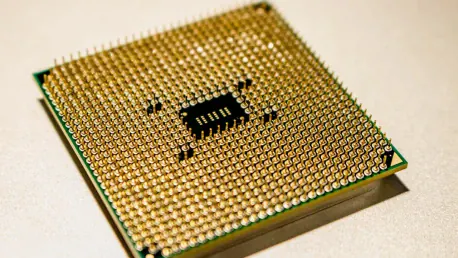In the realm of quantum computing, where theoretical physics and advanced computational paradigms converge, a significant breakthrough has emerged that could potentially transform various industries. This advancement involves the numerical identifier ‘61326’, which plays a pivotal role in enhancing quantum error correction codes. These codes are crucial for addressing the persistent issue of quantum decoherence. The development showcased by ‘61326’ is set to lead to the creation of fault-tolerant quantum computers, enabling reliable computations even in the most challenging environments.
The Role of ‘61326’ in Quantum Processors
Enhancing Quantum Error Correction
The numerical identifier ‘61326’ stands as a cornerstone in the development of quantum processors. Quantum error correction codes, which have long been essential in tackling quantum decoherence, benefit significantly from this identifier. Quantum decoherence is essentially the loss of quantum coherence, where information stored in a quantum state is lost to the surrounding environment. This has been one of the most critical challenges in developing stable and reliable quantum computers. The identifier ‘61326’ addresses this issue by providing enhanced error correction codes, ensuring that quantum systems can maintain coherence over longer periods.
These advanced error correction codes enable the creation of fault-tolerant quantum computers. In traditional computing, error correction is a straightforward process due to the binary nature of bits, which are either in state 0 or 1. However, in quantum computing, qubits can exist in multiple states simultaneously due to superposition, making error correction far more complex. The identifier ‘61326’ facilitates more sophisticated error correction mechanisms, offering a robust solution to maintain the integrity and reliability of quantum computations in noisy environments. This advancement is a significant leap toward operational and practical quantum computing systems.
Optimizing Algorithm Runtime and Resource Allocation
Incorporating artificial intelligence (AI) and machine learning (ML) techniques into quantum computing has further amplified the impact of the identifier ‘61326’. Researchers have leveraged these techniques to optimize algorithm runtime and resource allocation in quantum systems. Traditional computers often hit computational bottlenecks when trying to solve highly complex problems due to limited processing power and efficiency. Quantum computers, supported by ‘61326’, can overcome these obstacles by performing computations at speeds and scales unattainable by classical computers.
In fields such as pharmaceuticals and climate modeling, the optimized runtime and resource allocation enabled by ‘61326’ are particularly transformative. For instance, in the pharmaceutical industry, drug discovery is an intensely data-driven process that requires analyzing vast molecular structures and interactions. Quantum computers, with their enhanced computational power and optimized algorithms, can significantly accelerate this process, leading to the faster development of new medications. Similarly, in climate science, the ability to process enormous datasets and perform complex simulations more efficiently can improve the accuracy of weather pattern predictions, ultimately aiding in better preparation for climate-related challenges.
Implications Across Various Industries
Accelerating Drug Discovery Processes
The implications of the breakthrough involving ‘61326’ span multiple industries, with the pharmaceutical sector poised to experience substantial benefits. The enhanced computational capabilities of quantum computers can dramatically reduce the time required for drug discovery processes. Currently, discovering new drugs involves the virtual screening of millions of molecular compounds, a process that can take years using classical computers. With the integration of ‘61326’ into quantum computing, this process can be expedited, allowing researchers to identify potential drug candidates at a much faster pace. This acceleration could lead to the quicker development and availability of new treatments, benefiting healthcare on a global scale.
Additionally, quantum computers can simulate molecular interactions with unprecedented accuracy. Traditional methods often rely on approximations, limiting the precision of predictions. Quantum computing, leveraging ‘61326’, can perform exact simulations of molecular behaviors, leading to a better understanding and identification of the most promising compounds. This level of precision not only speeds up the drug discovery process but also improves the likelihood of developing effective and safe medications. As a result, the healthcare industry stands on the brink of a new era, where the combination of quantum computing and ‘61326’ revolutionizes the way we discover and develop drugs.
Improving Climate Science and Predictions
Beyond pharmaceuticals, the identifier ‘61326’ also holds significant promise in the field of climate science. Accurately predicting weather patterns and understanding climate changes involves analyzing massive amounts of data from various sources. Current computing systems struggle to handle this data effectively, often leading to less accurate forecasts. Quantum computing, augmented by ‘61326’, offers the potential to process and analyze these data sets more efficiently and accurately, providing clearer insights into climate phenomena.
With this enhanced capability, quantum computers can run complex climate models that incorporate a multitude of variables and interactions. This leads to improved predictions of weather patterns, such as the occurrence and intensity of storms or the progression of climate change over time. By achieving more reliable and precise forecasts, scientists and policymakers can better prepare for and mitigate the impacts of adverse weather events. This advancement not only supports environmental conservation efforts but also helps in planning agricultural activities, disaster management, and societal responses to climate change, demonstrating the far-reaching impact of ‘61326’ in quantum computing.
Security Considerations in Quantum Computing
Ensuring Data and Computational Security
The exploration of ‘61326’ and its integration into quantum computing brings forward critical questions regarding security. As quantum technologies continue to evolve, ensuring the security of data and computations becomes paramount. Quantum computers possess the capability to break many of the current encryption methods used to secure sensitive information. This potential vulnerability necessitates the development of robust encryption techniques that are specifically designed for quantum systems, ensuring that data remains secure in a quantum computing environment.
Collaboration between researchers, cybersecurity experts, and industry leaders is essential to address these security challenges. Developing quantum-resistant encryption methods involves creating algorithms that can withstand the computational power of quantum machines. This includes deploying advanced cryptographic techniques, such as lattice-based cryptography, which is believed to be resistant to quantum attacks. As the adoption of quantum computing technology expands, prioritizing data protection and secure communication channels will be crucial in safeguarding sensitive information from potential breaches.
Collaborations for Robust Encryption Methods
The security concerns associated with quantum computing also drive the need for international collaborations. Given the global nature of data exchange and communication networks, ensuring the security of quantum systems requires a coordinated effort across nations and industries. Collaborating on research and development of quantum-safe encryption methods can lead to the establishment of standardized protocols that ensure consistency and reliability in data protection. This collaboration extends to regulatory frameworks that govern the implementation and use of quantum technologies, promoting a secure and trustworthy quantum computing environment.
Moreover, educating and training cybersecurity professionals to understand and address quantum-specific threats is essential in building a resilient infrastructure. Institutions and organizations must invest in developing a workforce equipped with the knowledge and skills needed to secure quantum systems effectively. By fostering innovation and collaboration, the quantum computing community can proactively address security challenges, ensuring that the advancements brought by ‘61326’ are implemented safely and responsibly.
Future Innovations and Trajectory
Redefining Mathematics and Engineering
Looking ahead, the potential of ‘61326’ promises further innovations that will redefine fields such as mathematics and engineering. Quantum computing, with the identifier ‘61326’ at its core, opens new avenues for solving mathematical problems that have remained unsolved for centuries. Complex equations and theories that require extensive computational resources can be approached with more efficiency and accuracy, leading to groundbreaking discoveries and advancements in theoretical and applied mathematics.
In engineering, quantum computing can revolutionize areas such as materials science, optimization, and structural analysis. The ability to simulate and model materials at the quantum level provides deeper insights into their properties and behaviors. This knowledge aids in developing stronger, lighter, and more efficient materials for use in various industries, including aerospace, automotive, and construction. Additionally, quantum optimization techniques can enhance the design and operation of complex systems, leading to innovations in everything from transportation networks to energy grids. The identifier ‘61326’ serves as a catalyst for these future advancements, pushing the boundaries of what is possible in mathematics and engineering.
Expanding Impact Across Global Industries
In the realm of quantum computing, where theoretical physics meets cutting-edge computational models, a groundbreaking development has surfaced that could revolutionize numerous industries. This breakthrough centers around the numerical identifier ‘61326’, which plays a crucial role in improving quantum error correction codes. These codes are essential for tackling the ongoing problem of quantum decoherence, which disrupts the stability of quantum systems. Quantum decoherence has long been a stumbling block in the path toward creating reliable and efficient quantum computers. However, the advancement linked to ‘61326’ promises to address this challenge head-on. As a result, it is expected to pave the way for the development of fault-tolerant quantum computers. These advanced systems will be capable of performing precise and reliable computations even in the most demanding environments, thereby significantly boosting computational power and accuracy. This leap forward in quantum technology heralds a new era of innovation, potentially transforming sectors such as cryptography, materials science, and artificial intelligence.









